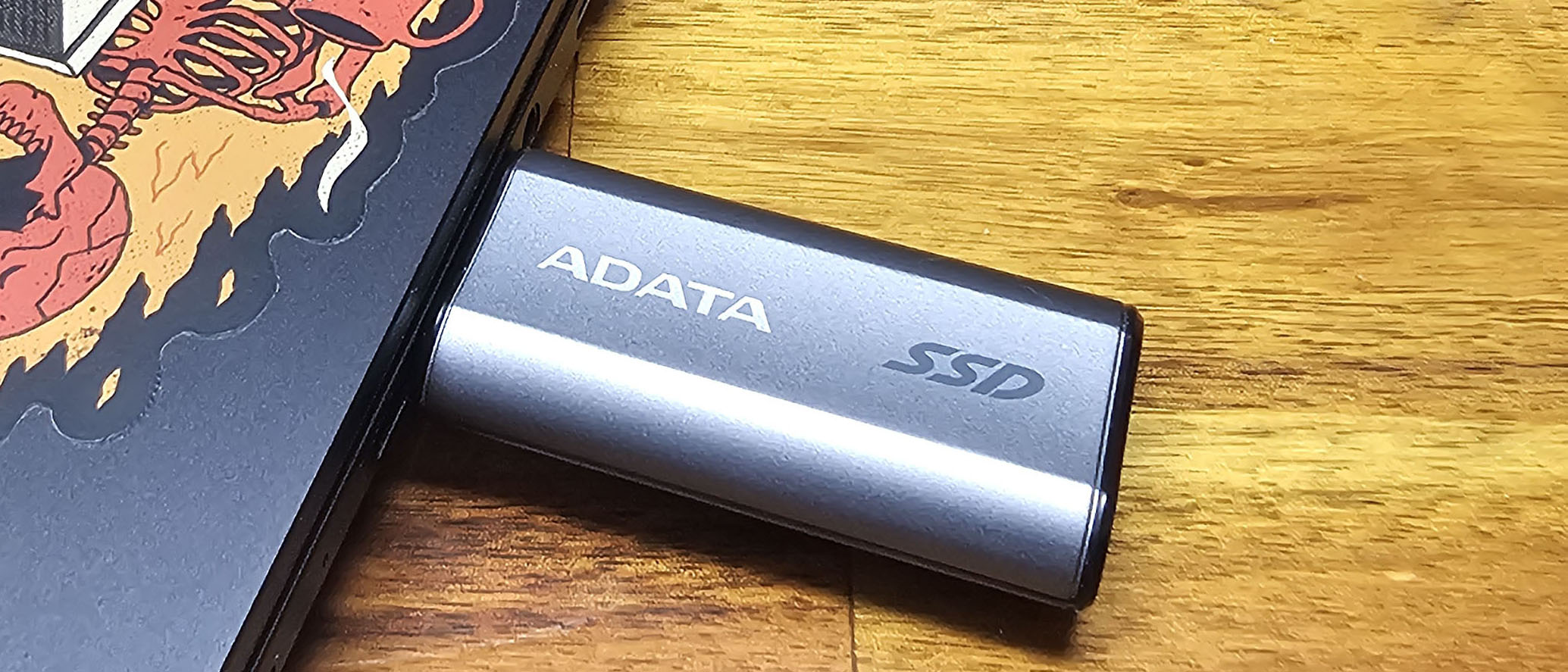Tom's Hardware Verdict
Adata's SC750 delivers true 10Gbps SSD speeds in a flash drive form factor with a retractable USB-C connector. Its width means it's likely to block nearby ports, but it's smaller than its main competition and nearly as fast.
Pros
- +
True SSD speeds
- +
Much smaller than competing SK hynix drive
- +
Retractable USB-C port means there's no cap to lose
- +
Will be available in 2TB capacity
Cons
- -
Width means it will likely block adjacent ports
Why you can trust Tom's Hardware
The line between the best external SSDs and the best flash drives continues to blur. Not long ago, SK hynix impressed us by putting an actual SSD inside of a flash-drive-like housing, making the Tube T31 the fastest "flash drive" we've tested to date. Now Adata has effectively done the same thing with its SC750 drive, which is nearly as fast in our testing as the Tube T31 and about half the size.
The SC750 also sports a retractable USB-C port in place of the SK hynix drive's USB-A port under an easy-to-lose cap. And while we tested the 1TB model of the Adata drive, a 2TB version should be available sometime in September according to a company representative, making Adata's drive more spacious than the SK hynix Tube T31, which still tops out at 1TB.
Adata SC750 Specs
| Product | 512GB | 1TB | 2TB |
|---|---|---|---|
| Pricing | $69.99 | $84.99 | $142.99 |
| Interface / Protocol | USB-C 3.2 Gen2 | USB-C 3.2 Gen2 | USB-C 3.2 Gen2 |
| Sequential Read | Up to 1,050 MB/s | Up to 1,050 MB/s | Up to 1,050 MB/s |
| Sequential Write | Up to 1,000 MB/s | Up to 1,000 MB/s | Up to 1,000 MB/s |
| Dimensions | 2.09 x 1.08 x 0.47 inches (53mm x 27.5mm x 11.89mm) | Row 4 - Cell 2 | Row 4 - Cell 3 |
| 11.15 grams | 11.15 grams | 11.15 grams | Row 5 - Cell 3 |
| Warranty | 5 years | 5 years | 5 years |
External Design
The Adata SC750 sports the same distinctive wide, flat shape that the company has been using for years, which we saw most recently with the SD810 – except the SC750 is much smaller.
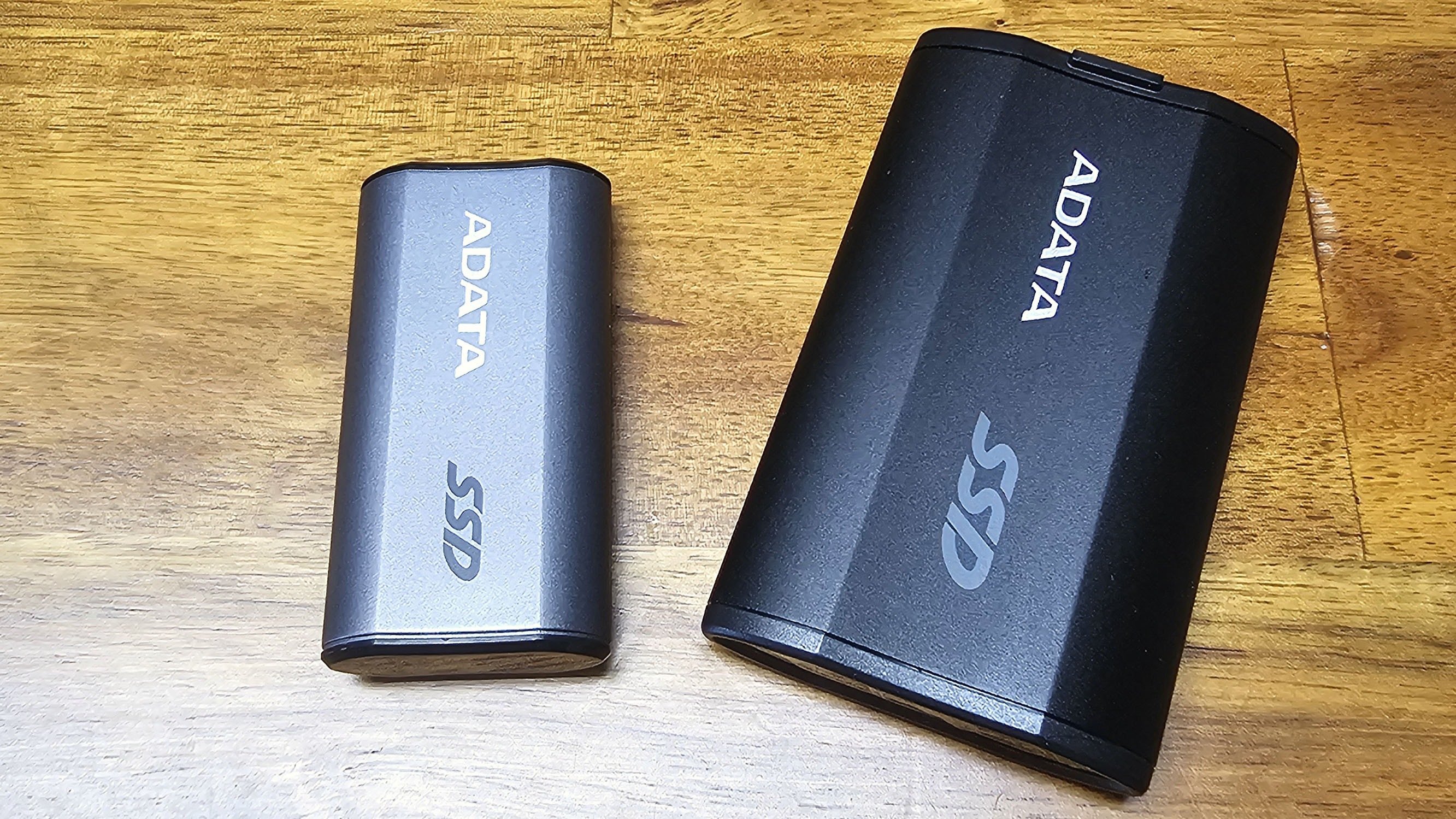
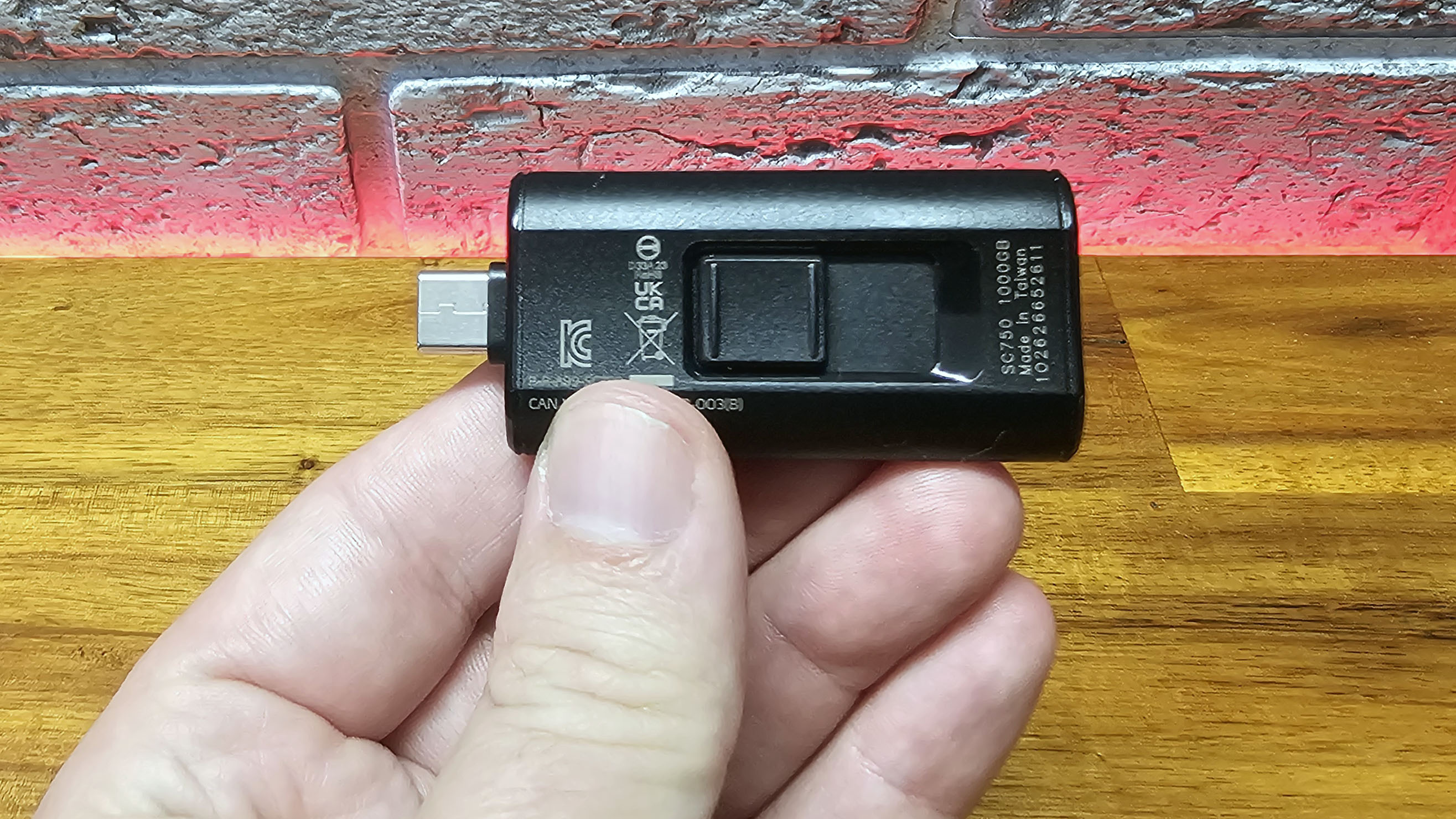
At 2.09 x 1.08 x 0.47 inches, the SC750 is about half the size of the SK hynix Tube T31, especially with its USB-C port retracted into its plastic shell. That said, like the Tube T31, the SC750's width means it will often block nearby ports. Specifically, when it's plugged into my Asus Zenbook 14, the second USB-C port is blocked. These SSD sticks do have their drawbacks, despite their speed and cable-free designs.
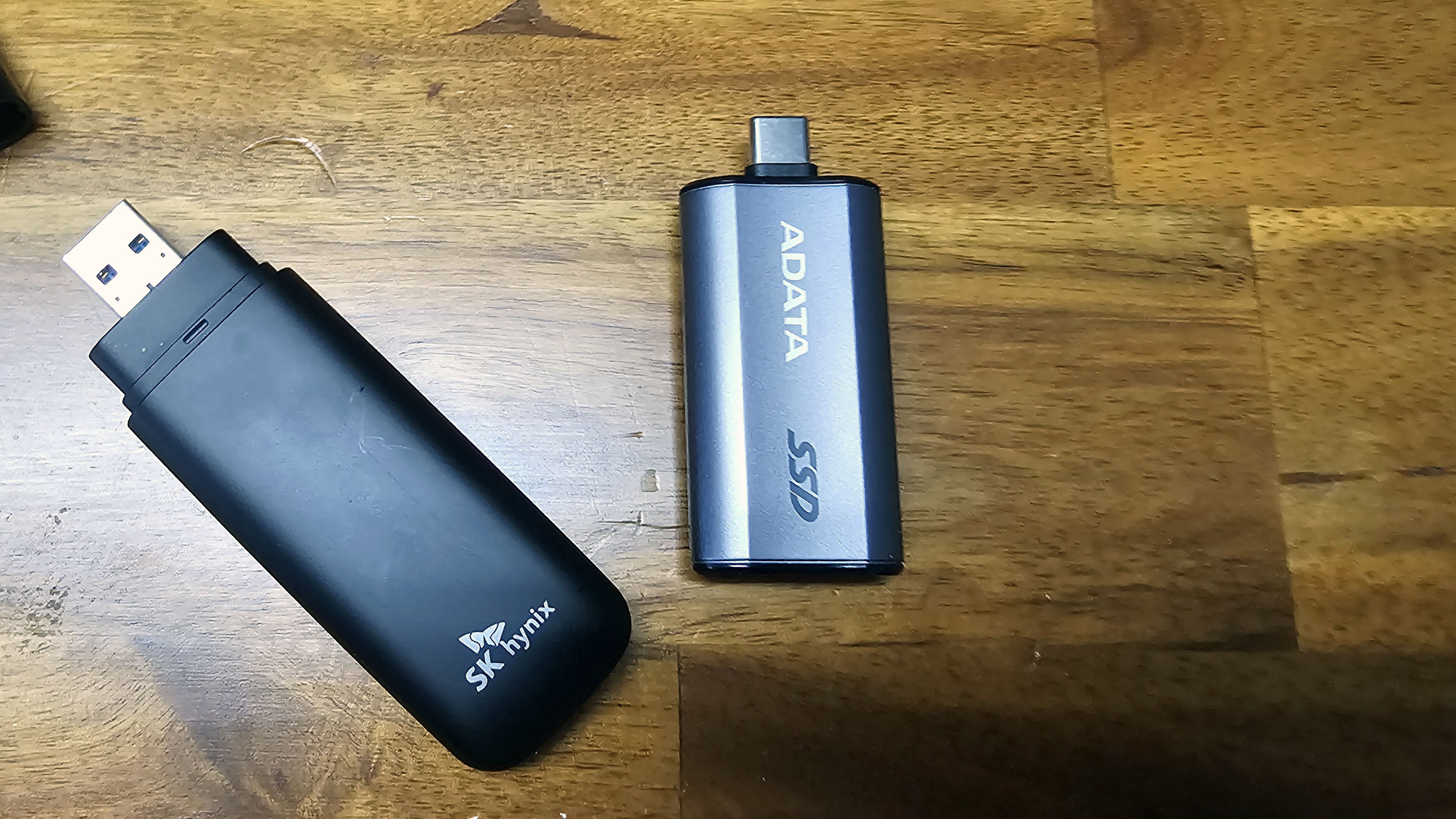
Inside the SC750
Popping open the plastic housing, it's clear how Adata's drive manages to be smaller than the competing SK Hynix model. Adata has foregone a physical M.2-to-USB interface and instead put its flash and other components directly on a PCB that includes the USB-C port.
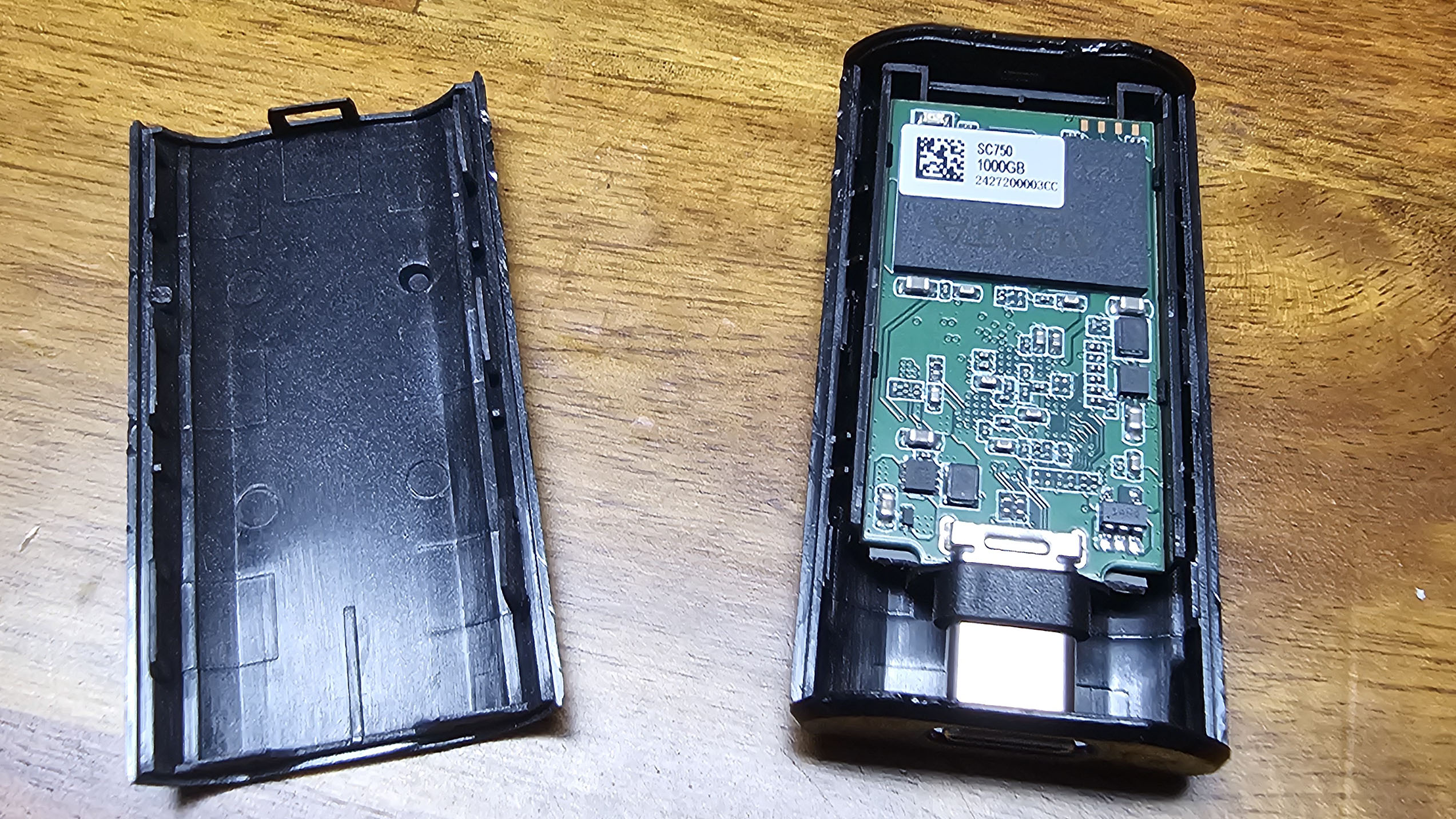
The other side of the PCB hosts another flash package (on our 1TB model), as well as a Silicon Motion SM2320G controller, underneath a thermal pad that would probably be more effective if the housing were metal rather than plastic.
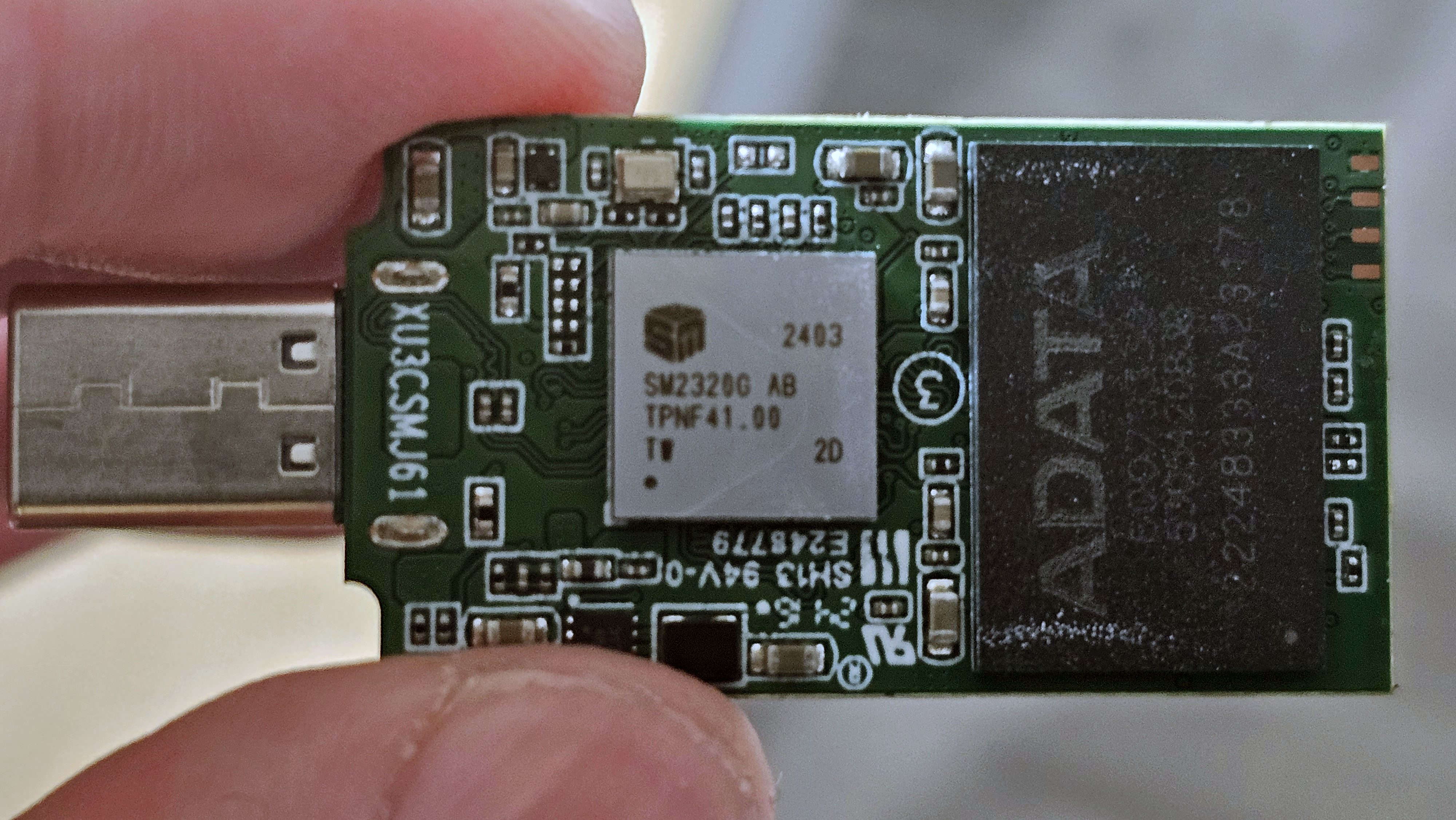
SK hynix's larger internal frame, though, makes room for metal heatsinks on both sides, so I'd expect it to perform better during sustained write tasks than Adata's SC750, with its all-plastic shell.
Comparison Products
The Adata SC750 is already selling below its MSRP on Amazon, at $59 for the 500GB model and $79 for the 1TB version we tested. A company representative told us the 2TB model, when it arrives in September, will sport an MSRP of $142. If that model's street price slips below $140, it should be quite appealing.
That said, when we wrote this, the competing SK hynix Tube T31 was selling for $69 for the 1TB model, or $10 less than the Adata drive at the same capacity. It is on sale, however, so the Adata drive might be cheaper than the Tube T31 by the time you read this. Kingston's DataTraveler Max, another speedy flash drive that you'll find in our test results below, was selling for $81 at the 1TB when we wrote this.
Trace Testing - PCMark 10 Storage Benchmark
PCMark 10 is a trace-based benchmark that uses a wide-ranging set of real-world traces from popular applications and everyday tasks to measure the performance of storage devices.
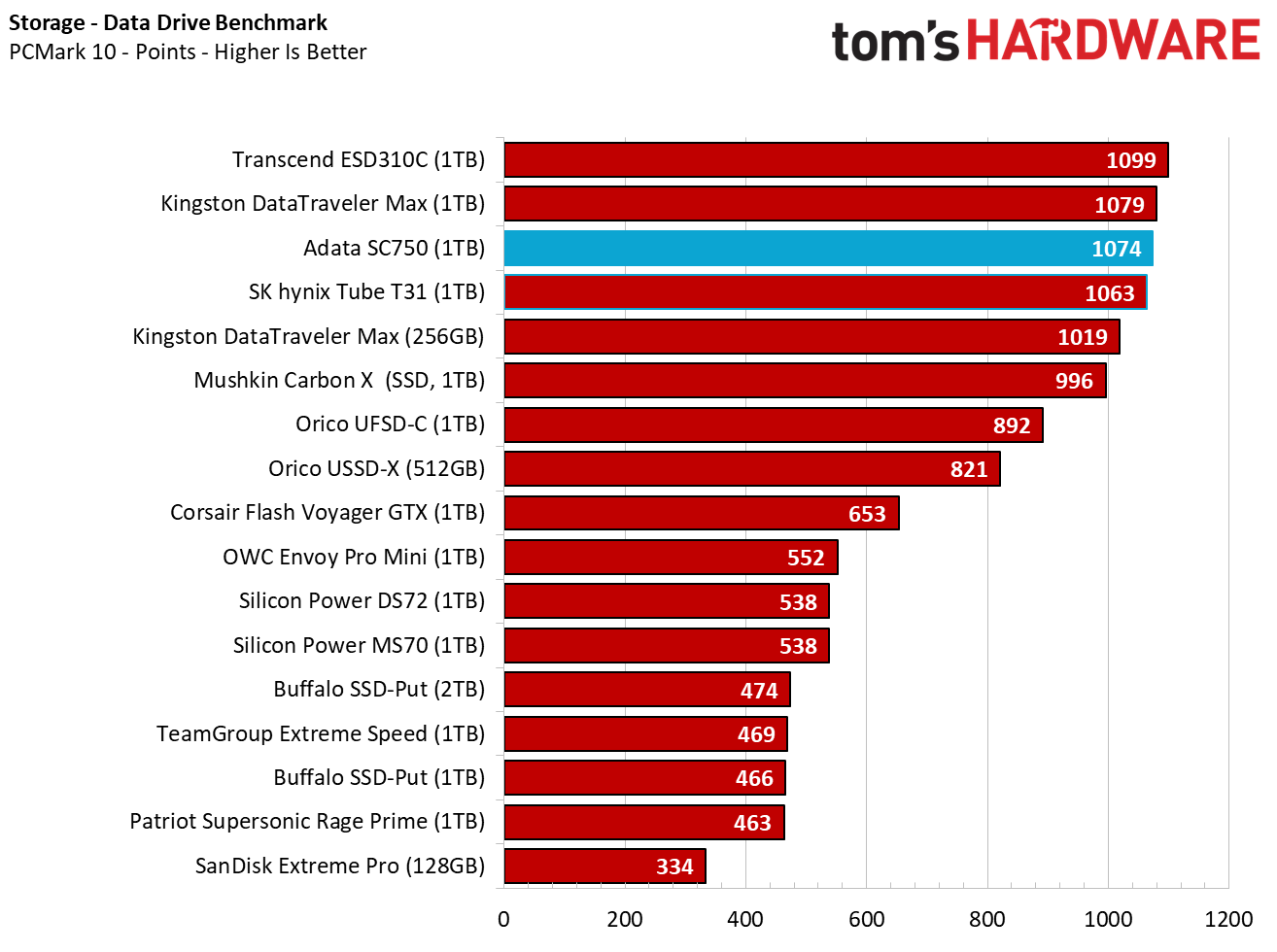
The differences near the top of this chart are mostly close enough to fall between general run-to-run variance. But the Adata SC750 comes in third here, just ahead of the SK hynix Tube T31.
Transfer Rates – DiskBench
We use the DiskBench storage benchmarking tool to test real-world file transfer performance with a custom 10GB dataset. We copy 4,617 files (images, videos, and software ISO files) to a folder on the test drive (write). Then, after leaving the system idle for at least five minutes, we run the same test in reverse, moving the test folder to a different location on our PCIe 4.0 testing drive.
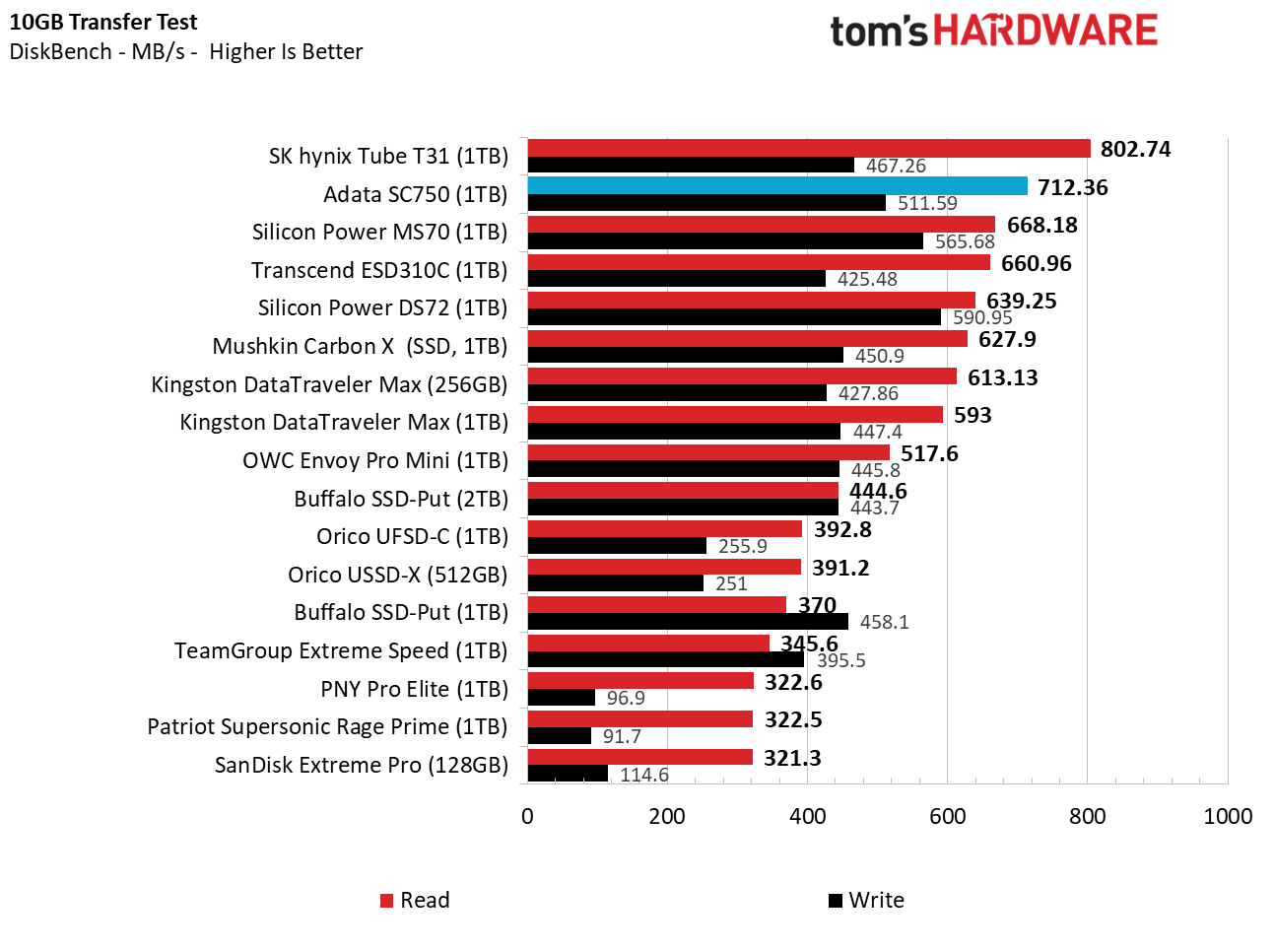
On this test, the Tube T31 landed on top on real-world read speeds, with the SC750 in second place. But the Adata drive is actually faster on the write portion of this test than the SK hynix drive.
Synthetic Testing CrystalDiskMark
CrystalDiskMark (CDM) is a free and easy-to-run storage benchmarking tool that SSD companies commonly use to assign product performance specifications. It gives us insight into how each device handles different file sizes. We run this test at its default settings.
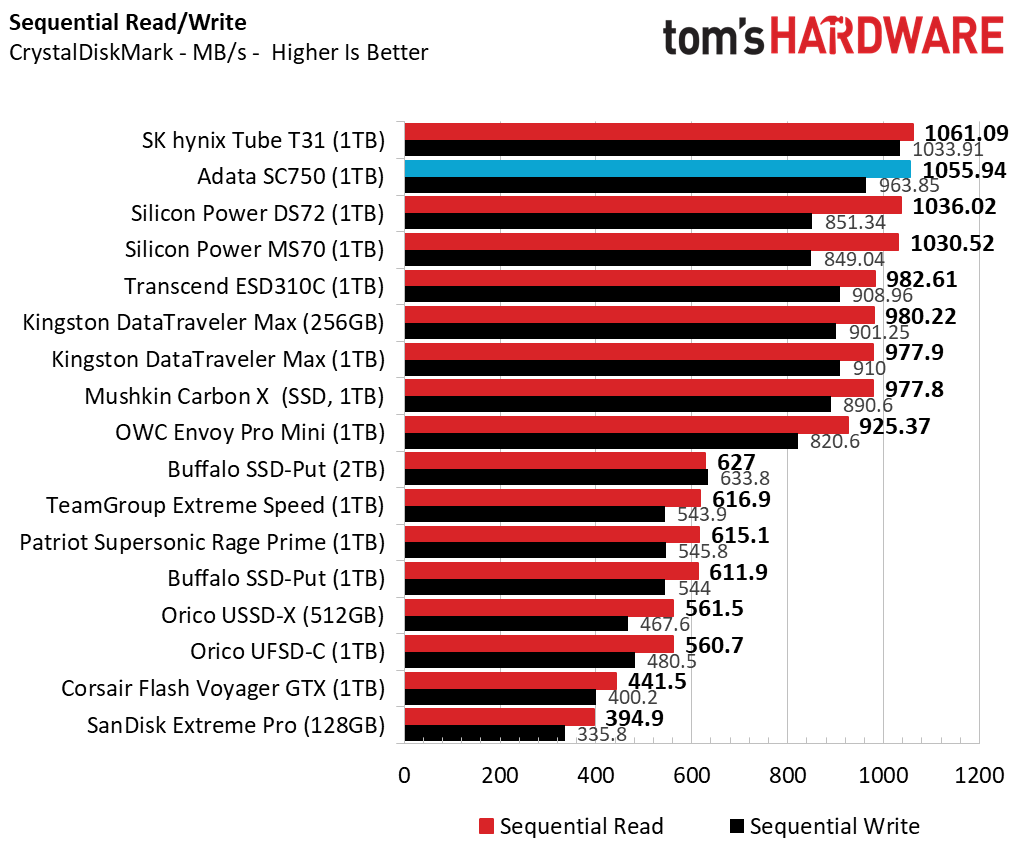
On this synthetic sequential test, the Tube T31 beats the SC750 in both reads and writes, though there's not much difference between the two – especially when it comes to read speeds. Both are right up against the limitations of their 10Gbps interface.
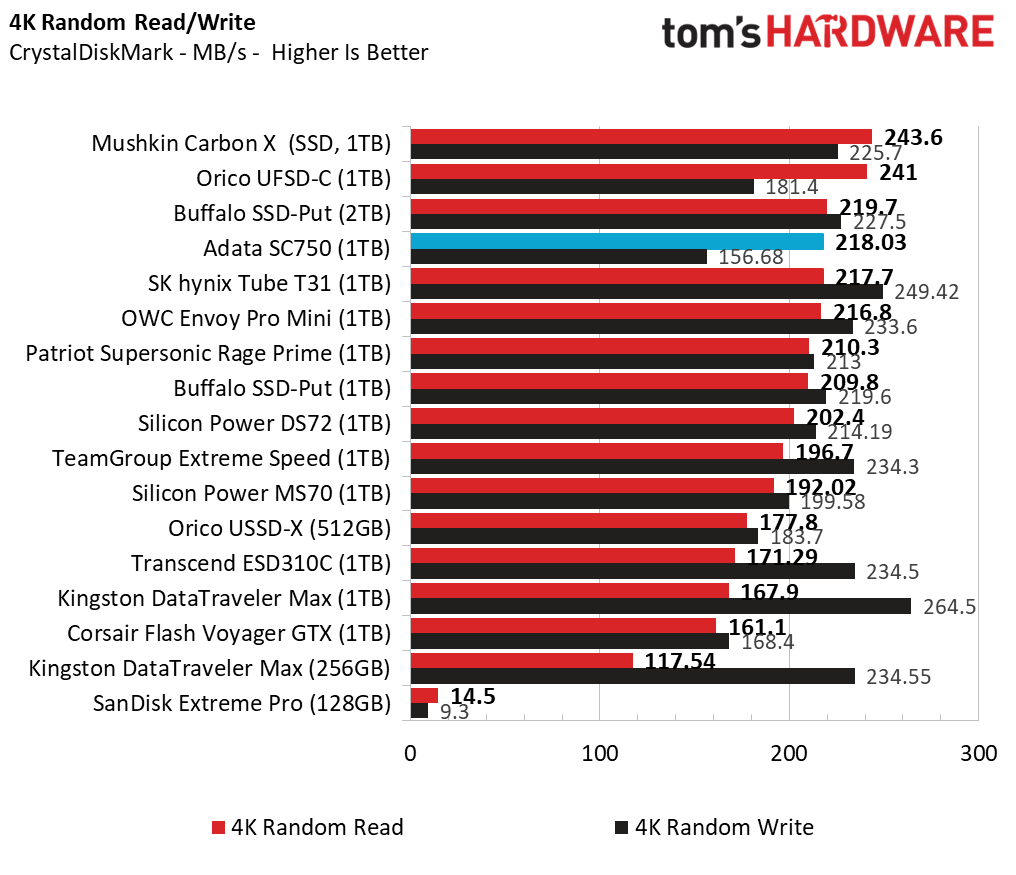
When it comes to small files, neither the Adata or SK hynix drives are in the top three of models we've tested, but the Adata drive manages to just barely beat the SK hynix Tube T31 in reads, while the Tube T31 is significantly faster in small file writes.
Conclusion

In our testing, the Adata SC750 was a little slower overall compared to the larger SK hynix Tube T31, but not in ways you'd likely notice without benchmarks. And while the Adata drive is just coming onto the market, the two drives seem like they're going to be priced similarly.
The hynix drive sports a USB Type-A port under a cap, while the Adata SC750 uses a retractable USB-C connector (so there's no cap to lose). Both drives are about as speedy as you can currently get in the "flash drive" or "stick SSD" form factor. So if you're stuck deciding between the two, I'd opt for whichever model has the port that's more convenient to your use cases or whichever one is on sale for less. Still, if you like these drives and need 2TB, the Adata SC750 is your only option – or at least it will be when the more spacious model goes on sale, sometime in September.
After a rough start with the Mattel Aquarius as a child, Matt built his first PC in the late 1990s and ventured into mild PC modding in the early 2000s. He’s spent the last 15 years covering emerging technology for Smithsonian, Popular Science, and Consumer Reports, while testing components and PCs for Computer Shopper, PCMag and Digital Trends.
